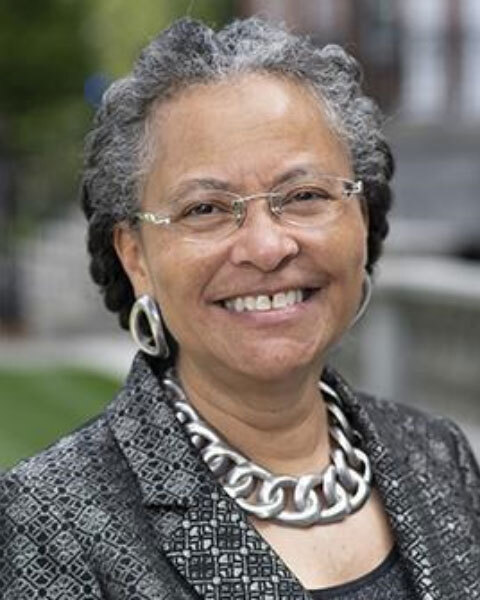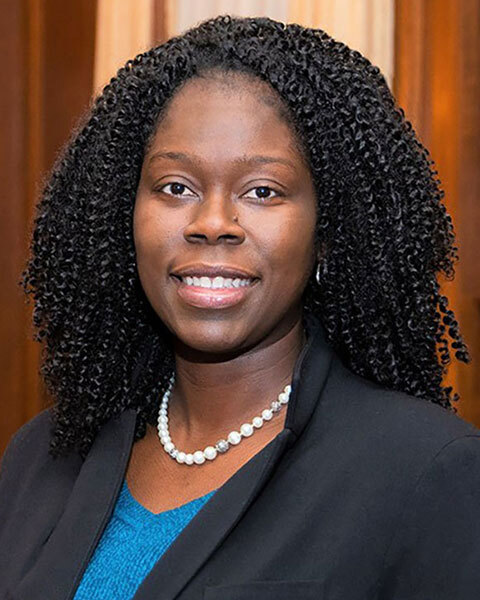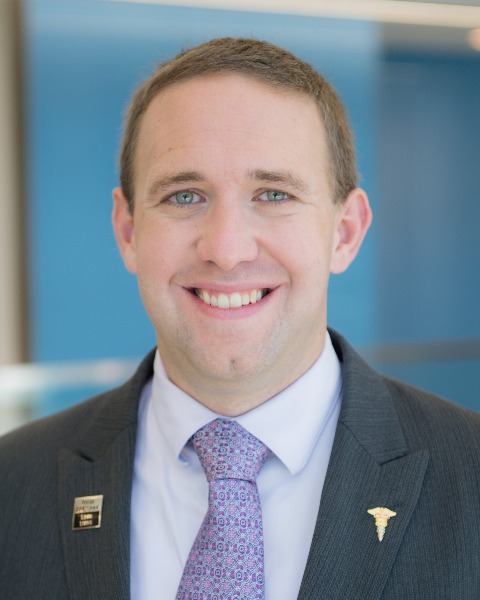
Big Ideas Plenary Session: Why Diversity Matters for Addiction Treatment and Prevention
-
Register
- Non-Member - Free!
- Regular Member - Free!
- Retired - Free!
- Early Career Physician - Free!
- Resident - Free!
- Student - Free!
- Associate - Free!
- ASAM Staff - Free!
- International Member - Free!
- Emeritus Member - Free!
- Provisional Member - Free!
- Fellow Member - Free!
- Honorary Member - Free!
- CRT Member - Free!

Big Ideas Plenary Session
Why Diversity Matters for Addiction Treatment and Prevention
Recorded: Thursday, April 22, 2021 - Saturday, April 24, 2021
On-Demand Session
Overview
This 2-hour on-demand session from ASAM Virtual 2021 addresses the BIG IDEAS that are shaping the future of addiction medicine, and this year is all about diversity and health equity.
"Why Diversity Matters for Addiction Treatment and Prevention"
This session features BIG IDEAS that are shaping the future of addiction medicine, and this year is all about diversity and health equity. First, draw inspiration as ASAM President Paul H. Earley, MD, DFASAM, recognizes award recipients with personalized video clips of these individuals who have made major contributions to the field. ASAM Board Member Brian Hurley, MD, MBA, DFASAM, will then introduce the Deputy Director of the National Institute of Minority Health and Health Disparities, followed by world-renowned civil rights activist and icon, and moderate an engaging Q&A with these distinguished experts.
Dr. Monica Webb Hooper will discuss the National Institute on Minority Health and Health Disparities (NIMHD) recommendations to address health disparities and achieve equity in patient care, taking into account patient-provider and community-wide interventions.
Dr. Camara Phyllis Jones will make the case that it is important to name racism because racism is foundational in our nation’s history and yet many people are in staunch denial of its continued existence and profoundly negative impacts on the health and well-being of the nation. She will share allegories and definitions to illustrate four key messages when naming racism: racism exists; racism is a system; racism saps the strength of the whole society; and we can act to dismantle racism.
This session will begin with the recognition of award recipients, including:
ASAM Media Awards - Claudia Black, MSW, PhD & Navdeep Kang PsyD, HSP, CGP
ASAM Annual Award " Martha J. Wunsch, MD, FAAP, DFASAM
ASAM Educator of the Year Award " Richard Saitz, MD, MPH, FACP, DFASAM
John P. McGovern Award " Margaret A. Jarvis, MD, DFASAM
The target audience for this beginner level session includes physicians, nurse practitioners, physician assistants, other clinicians, researchers, residents, fellows, students, and counselors.
This session addresses the following ACGME Competencies: Practice-Based Improvement, Professionalism, Systems Based Practice.
Learning Objectives
Upon completion, learners will be able to:
- Describe federal agency recommendations to address health disparities, taking into account patient-provider and community-wide interventions
- Describe federal agency recommendations to achieve equity in patient care, taking into account patient-provider and community-wide interventions
- Define four key messages when naming racism
- Implement actions toward dismantling racism to reduce its profoundly negative impacts on the health and well-being of the nation
Fees
| Rate Description | Rate |
| ASAM Member | $29 |
| Non-Member | $39 |
| Associate Member | $19 |
| Resident Member* | $19 |
| Student Member* | $19 |
*Residents, Fellows-in-training, Interns, and Students must join ASAM to receive a discounted registration rate. Click here to become an ASAM member. National and Chapter membership dues apply. There is no charge for Students to become a Member, but verification of student status is required.
Membership Question? Call ASAM at 1.301.656.3920, email us, or view the ASAM website for more information.
Refunds & Cancellations
All ASAM e-Learning Center refund requests must be made in writing to education@asam.org within 90 days of purchase. Those requesting refunds for courses that are in progress will receive partial refunds or e-Learning Center credit. Automatic full refunds will be made for any course with a live-course component that has been cancelled.
Registration Deadline: 04/30/2024
Course Instructions
- Click the Contents tab and select "View On-Demand Recording". After viewing the entire video, return to the Contents tab.
- Click "Complete Post Test" to answer quiz questions. You will have 10 attempts and must get at least 2 out of 3 questions correct. After completing the quiz, return to the Contents tab.
- Click Complete Evaluation to answer evaluation questions. Scroll down on all questions, there are answers that expand past the size of the window. Submit the evaluation (the next box should activate, and the evaluation box should turn green with a white check mark).
- Click the button “Claim Credits” in the box titled “Claim Credits & Certificate." Choose the type of credit and click submit. Click the button “View/Print Certificate” to save or print your certificate. If you ever lose your certificate, you can come back to the ASAM e-Learning Center and view it on your transcript (found in the Dashboard).
Need Assistance?
If you have are experiencing any log in issues, cannot access a course, need assistance claiming credit, or have other questions or concerns, please e-mail Education@asam.org for assistance.
For learners who may have difficulty typing, moving a mouse or reading, Essential Accessibility is an application available for use to assist.

Camara Phyllis Jones
MD, MPH, PhD
Camara Phyllis Jones is a family physician and epidemiologist whose work focuses on naming, measuring, and addressing the impacts of racism on the health and well-being of the nation. She is a past president of the American Public Health Association, a senior fellow at the Morehouse School of Medicine, and an adjunct professor at the Rollins School of Public Health at Emory University.
Racism is a system of structuring opportunity and assigning value based on the social interpretation of how one looks (which is what we call “race”), which unfairly disadvantages some individuals and communities, unfairly advantages other individuals and communities, and saps the strength of the whole society through the waste of human resources. While at Radcliffe, Jones is developing tools to inspire, equip, and engage all Americans in a national campaign against racism. For example, her allegories on “race” and racism illuminate topics that are otherwise difficult for many Americans to understand or discuss. Her toolbox will equip both children and adults to name racism, ask “How is racism operating here?” and organize and strategize to act.
Jones earned her BA in molecular biology from Wellesley College, her MD from the Stanford School of Medicine, and both her master of public health and her PhD in epidemiology from the Johns Hopkins School of Hygiene and Public Health. She also completed residency training in general preventive medicine at Johns Hopkins and in family medicine at the Residency Program in Social Medicine at Montefiore Medical Center.

Monica Webb Hooper
PhD
Dr. Monica Webb Hooper is Deputy Director of the National Institute on Minority Health and Health Disparities (NIMHD). She works closely with the Director, Dr. Pérez-Stable, and the leadership, to oversee all aspects of the institute and to support the implementation of the science visioning recommendations to improve minority health, reduce health disparities, and promote health equity.
Dr. Webb Hooper is an internationally recognized translational behavioral scientist and licensed clinical health psychologist. She has dedicated her career to the scientific study of minority health and racial/ethnic disparities, focusing on chronic illness prevention and health behavior change. Her program of community engaged research focuses on understanding multilevel factors and biopsychosocial mechanisms underlying modifiable risk factors, such as tobacco use and stress processes, and the development of community responsive and culturally specific interventions.
Before joining NIMHD, Dr. Webb Hooper was a Professor of Oncology, Family Medicine & Community Health and Psychological Sciences at Case Western Reserve University. She was also Associate Director for Cancer Disparities Research and Director of the Office of Cancer Disparities Research in the Case Comprehensive Cancer Center. During her time as a professor, Dr. Webb Hooper directed the Tobacco, Obesity, and Oncology Laboratory, was principal investigator of multiple federal and foundation grants, and trained dozens of underrepresented trainees at all levels.
Dr. Webb Hooper completed her doctorate in clinical psychology from the University of South Florida, internship in medical psychology from the University of Florida Health Sciences Center, and her Bachelor of Science from the University of Miami.

Paul H. Earley
MD, DFASAM
Paul H. Earley, MD, DFASAM has worked in Addiction Medicine for 35 years. He treats all types of addictive disorders and specializes in the assessment, treatment, and management of health care professionals. As a therapist, he works with patients already in recovery, providing long term therapy for those who suffer from this disease. His professional expertise extends to advocacy for professionals before agencies and licensing boards. Dr. Earley is a dynamic speaker and educator; he speaks and trains on topics of addiction, its treatment and addiction among health care professionals. In addition, he trains therapists about the neurobiological basis of psychotherapy. In his travels, he has provided training in the United States, Canada, the United Kingdom, Italy, Iceland and Switzerland. He is the author of three books and numerous research articles on addiction and its treatment. His two most recent books, RecoveryMind Training and the RecoveryMind Training Implementation Guide describe an innovative and comprehensive system designed to reengineer addiction treatment. He is a contributing author to the American Society of Addiction Medicine (ASAM) Textbook: Principles of Addiction Medicine, as author of the chapter: Physician Health Programs and Addiction among Physicians and a contributing author to the ASAM Criteria. His work was featured in the documentary series on addiction entitled Close to Home by Bill Moyers. Dr. Earley is the Immediate Past President of the American Society of Addiction Medicine (ASAM). He is the Medical Director of the Georgia Professionals Health Program, Inc., the Physicians Health Program (PHP) for the state of Georgia and the Immediate Past President of the North American Federation of State Physician Health Programs (FSPHP). With Earley Consultancy, LLC, he works with treatment facilities, providing training in cohesive care, treatment effectiveness and staff development using RecoveryMind Training.
Relevant Financial Disclosures
- DynamiCare Health, Inc (Clinical Condition: All addiction variants): Employment, Ownership Interest includes stock, stock options, patent or other intellectual property
- Earley Consultancy, LLC (Clinical Condition: Addiction Management and Consultation): Employment
- Georgia Professionals Health Program, Inc. (Clinical Condition: substance use disorders): Employment

Brian Hurley
MD, MBA, DFASAM
Brian Hurley, MD, MBA, DFASAM is an addiction physician and the Director of Addiction Medicine for the Los Angeles County Department of Health Services. Brian is currently a Director at Large for the American Society of Addiction Medicine (ASAM) and will assume the position of President-Elect this April 2021. He co-chairs the Los Angeles County Department of Health Services’ Substance Use Disorders Workgroup and the SafeMedLA Medications for Addiction Treatment Action Team, and is the Clinical Director of the Addiction Treatment Starts Here programs through the Center for Care Innovations, focused on increasing the delivery of Medications for Addiction Treatment in California’s community health centers. He is the PI of two MAT Access Points projects funded by the Sierra Health Foundation, a co-PI of a TRDRP funded smoking cessation implementation project, and a co-investigator on NIDA, NIAAA, and PCORI funded addiction related implementation science grants managed through RAND. He is a member of the Motivational Interviewing Network of Trainers and regularly conducts motivational interviewing trainings throughout the United States. He is a Volunteer Assistant Clinical Professor of Addiction Medicine in the Department of Family Medicine at the UCLA David Geffen School of Medicine. He additionally serves on the American Board of Psychiatry and Neurology’s Addiction Psychiatry examination writing committee.
Brian completed the Robert Wood Johnson Foundation Clinical Scholars Program at the University of California, Los Angeles (UCLA), and was previously a UCLA - Veterans Administration National Quality Scholar at the VA Greater Los Angeles Healthcare System. He completed a fellowship program in addiction psychiatry at New York University School of Medicine. He completed residency training at the Massachusetts General Hospital and McLean Hospital, where he was Chief Resident in Addiction Psychiatry. Brian is a former National President of the American Medical Student Association.
No relevant financial disclosures
CME, CE, CEU and Other Credit Types

ACCME Accreditation Statement
The American Society of Addiction Medicine is accredited by the Accreditation Council for Continuing Medical Education (ACCME) to provide continuing medical education for physicians.
AMA Credit Designation Statement
The American Society of Addiction Medicine designates this enduring material for a maximum of 2 AMA PRA Category 1 Credits™. Physicians should claim only the credit commensurate with the extent of their participation in the activity.
American Academy of Physician Assistants
This activity has been reviewed by the AAPA Review Panel and is compliant with AAPA CME Criteria. This activity is designated for 2 AAPA Category 1 CME credits. Approval is valid from 5/26/2021 to 5/26/2022. PAs should only claim credit commensurate with the extent of their participation. AAPA reference number: CME-202755.
NAADAC, the Association for Addiction Professionals
This activity has been approved by the American Society of Addiction Medicine, as a NAADAC Approved Education Provider, for educational credits. NAADAC Provider #295, ASAM is responsible for all aspects of the programming.
California Association for Drug/Alcohol Educators (CAADE)
This educational program is approved by CAADE: #CP40 999 1222.
California Association of DUI Treatment Centers (CADTP)
This educational program is approved by CADTP: #205.
California Consortium of Addiction Programs and Professionals (CCAPP)
This educational program is approved by CCAPP: #OS-20-330-1222.
Continuing Education Credits (CEUs)
Non-physician participants will receive a certificate of attendance upon completion of the activity and an online evaluation confirming their participation. Participants should submit his/her certificate of attendance to their professional organization/institute.
Maintenance of Certification (MOC) or Continuing Certification Programs (CCP)
American Board of Medical Specialties (ABMS)
Through the American Board of Medical Specialties (“ABMS”) ongoing commitment to increase access to practice relevant Continuing Certification Activities through the ABMS Continuing Certification Directory, The ASAM Virtual.2021 has met the requirements as a MOC Part II CME Activity (apply toward general CME requirement) for the following ABMS Member Boards: Allergy and Immunology, Anesthesiology, Colon and Rectal Surgery, Family Medicine, Medical Genetics and Genomics, Nuclear Medicine, Physical Medicine and Rehabilitation, Plastic Surgery, Preventive Medicine, Psychiatry and Neurology, Radiology, Thoracic Surgery, Urology
American Board of Preventive Medicine (ABPM)
The American Board of Preventive Medicine (ABPM) has approved this activity for a maximum of 1 credit towards ABPM MOC Part II requirements.
American Board of Anesthesiology (ABA)
This activity contributes to the CME component of the American Board of Anesthesiology’s redesigned Maintenance of Certification in Anesthesiology TM (MOCA®) program, known as MOCA 2.0®.
American Board of Pediatrics (ABP)
Successful completion of this CME activity, which includes participation in the activity, with individual assessments of the participant and feedback to the participant, enables the participant to earn a maximum of 2 MOC point in the American Board of Pediatrics’ (ABP) Maintenance of Certification (MOC) program. It is the CME activity provider’s responsibility to submit participant completion information to ACCME for the purpose of granting ABP MOC credit.
American Board of Internal Medicine (ABIM)
Successful completion of this CME activity, which includes participation in the evaluation component, enables the participant to earn up to 2 Medical Knowledge MOC point in the American Board of Internal Medicine’s (ABIM) Maintenance of Certification (MOC) program. Participants will earn MOC points equivalent to the amount of CME credits claimed for the activity. It is the CME activity provider’s responsibility to submit participant completion information to ACCME for the purpose of granting ABIM MOC credits.
American Board of Surgery (ABS)
Successful completion of this CME activity, which includes participation in the evaluation component, enables the learner to earn credit toward the CME and/or Self-Assessment requirements of the American Board of Surgery’s Continuous Certification program. It is the CME activity provider's responsibility to submit learner completion information to ACCME for the purpose of granting ABS credit.
American Board of Psychiatry and Neurology (ABPN)
Successful completion of this CME activity can be used to satisfy the American Board of Psychiatry and Neurology’s (ABPN) CME requirement for Maintenance of Certification program.
American Board of Addiction Medicine (ABAM)
Successful completion of this activity can be used to satisfy the American Board of Addiction Medicine (ABAM) Tmoc credit requirements.
Royal College of Physicians and Surgeons of Canada (RCPSC)
Royal College Fellows can use participation in Accredited Continuing Medical Education to earn Section 3 Credits.
CME Committee, Program Planning Committee, and Faculty Disclosure Information
In accordance with disclosure policies of ASAM and the ACCME, the effort is made to ensure balance, independence, objectivity, and scientific rigor in all CME activities. These policies include mitigating all possible relevant financial relationships with ineligible companies for the Planning Committees, CME Committee, MEC, and Faculty. All activity Planning Committee members and Faculty have disclosed relevant financial relationship information. The ASAM CME Committee has reviewed these disclosures and determined that the relationships are not inappropriate in the context of their respective presentations and are not inconsistent with the educational goals and integrity of the activity.

